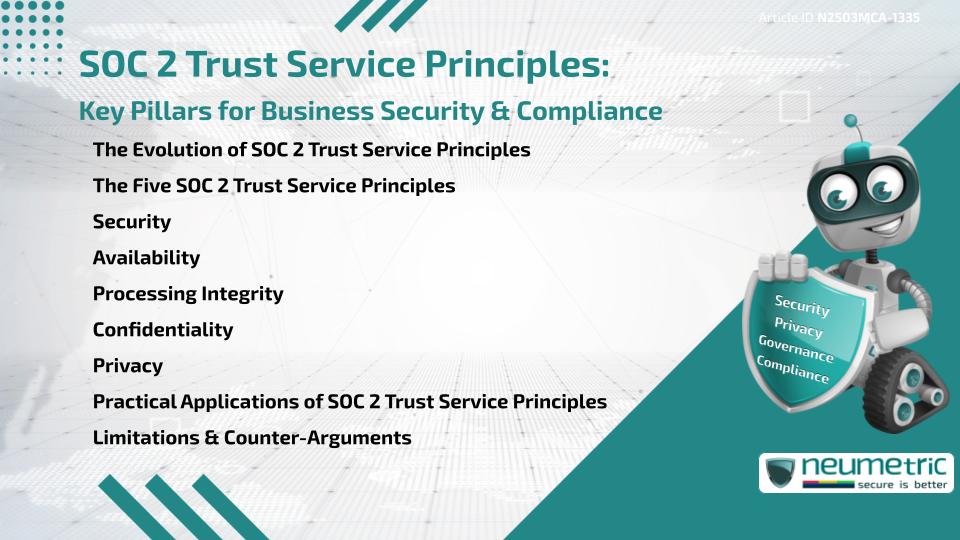Table of Contents
ToggleIntroduction
Businesses handling Sensitive Data must prioritise Security & Compliance to gain Customer Trust. The SOC 2 Trust Service Principles provide a framework to ensure Organisations safeguard data effectively. Developed by the American Institute of Certified Public Accountants [AICPA], these principles establish a standard for managing Customer Data.
This article explores the SOC 2 Trust Service Principles, their historical background, real-world applications, limitations & why they are vital for Business Security & Compliance.
The Evolution of SOC 2 Trust Service Principles
The SOC 2 Trust Service Principles originated from the need for a standardised approach to evaluating Security Controls. Before SOC 2, Businesses relied on general IT Security Frameworks, often lacking consistency. In response, AICPA introduced the Trust Service Criteria, shaping the SOC 2 Trust Service Principles into five (5) key categories: Security, Availability, Processing Integrity, Confidentiality & Privacy.
The Five SOC 2 Trust Service Principles
Security
Security is the foundation of the SOC 2 Trust Service Principles. It ensures protection against Unauthorised Access, Breaches & Cyber Threats. Measures such as Firewalls, Intrusion Detection Systems & Multi-factor Authentication help Businesses maintain security.
Availability
Availability focuses on System Uptime & Accessibility. Businesses must implement Redundancy, Disaster Recovery Plans & Network Monitoring to meet Service Commitments & avoid disruptions.
Processing Integrity
Processing Integrity ensures that data is processed correctly, reliably & in a timely manner. Organisations need proper validation Controls & Quality Assurance Mechanisms to maintain Data Accuracy & prevent Errors.
Confidentiality
Confidentiality involves protecting Sensitive Business & Customer Data from Unauthorised Access. Encryption, Role-based Access Control & Data Masking Techniques help Organisations comply with this principle.
Privacy
Privacy safeguards personal information through proper Collection, Usage & Disclosure Practices. Compliance with regulations like General Data Protection Regulation [GDPR] & California Consumer Privacy Act [CCPA] aligns with this principle.
Practical Applications of SOC 2 Trust Service Principles
Organisations across industries apply the SOC 2 Trust Service Principles to establish Security Best Practices. Cloud Service Providers, Financial Institutions & Healthcare Organisations implement these principles to ensure Data Protection & Regulatory Compliance.
For instance, Cloud Platformss rely on the Security Principle to protect stored Customer Data, while Financial Firms use Confidentiality Measures to safeguard Sensitive Financial Records.
Limitations & Counter-Arguments
While the SOC 2 Trust Service Principles offer a robust framework, they are not without limitations. SOC 2 reports are subjective, as Independent Auditors assess Compliance differently. Additionally, Compliance does not guarantee absolute Security, as evolving Cyber Threats require continuous adaptation.
Some argue that SOC 2 Trust Service Principles are resource-intensive, making Compliance challenging for Small Businesses. However, the long-term benefits of Customer Trust & Risk Mitigation often outweigh the Costs.
Conclusion
The SOC 2 Trust Service Principles provide Businesses with a structured approach to Data Security & Compliance. By adhering to these principles, Organisations can strengthen their Security Posture, build Customer confidence & meet Regulatory Requirements. While challenges exist, the benefits of implementing these principles make them essential for Businesses handling Sensitive Data.
Takeaways
- The SOC 2 Trust Service Principles focus on Security, Availability, Processing Integrity, Confidentiality & Privacy.
- They help businesses protect Customer Data, maintain Trust & comply with Regulations.
- While beneficial, Compliance requires resources & ongoing efforts to address Security Threats.
FAQ
What are SOC 2 Trust Service Principles?
They are a set of five (5) security-focused criteria—Security, Availability, Processing Integrity, Confidentiality & Privacy—established by AICPA to assess Business Data protection measures.
Why are SOC 2 Trust Service Principles important?
They help Organisations maintain Security, ensure Compliance with Industry Regulations & build Customer trust by safeguarding Sensitive Data.
Who needs to comply with SOC 2 Trust Service Principles?
Businesses handling sensitive Customer Data, such as Cloud Service Providers, Financial Institutions & Healthcare Organisations, benefit from Compliance.
How do Businesses implement SOC 2 Trust Service Principles?
Companies implement Security Controls, perform Risk Assessments & undergo independent Audits to meet SOC 2 Trust Service Principles requirements.
Are SOC 2 Trust Service Principles legally required?
While not Legally Mandatory, many Organisations require SOC 2 Compliance to demonstrate robust Security Practices & gain Client Trust.
How long is it estimated to achieve SOC 2 Compliance?
The process varies by company size & complexity but typically takes several months, involving Internal Assessments & Third-Party Audits.
What is the difference between SOC 1 & SOC 2 Compliance?
SOC 1 focuses on Financial Reporting Controls, while SOC 2 assesses broader Security Controls under the SOC 2 Trust Service Principles.
Can Small Businesses achieve SOC 2 Compliance?
Yes, though it requires resources, Small Businesses can adopt scalable Security Measures to align with the SOC 2 Trust Service Principles.
How often should Businesses update their SOC 2 Compliance?
Annual Audits are recommended to ensure ongoing Compliance with the SOC 2 Trust Service Principles & adapt to evolving Security Risks.





